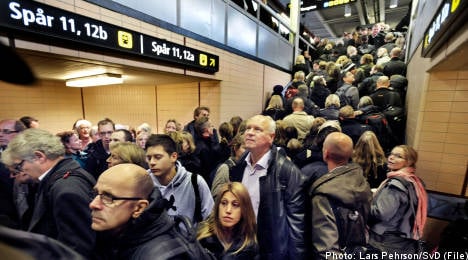SJ plans to pull eight trains out of service on Monday with the Stockholm-Gothenburg and Stockholm-Uppsala routes being most affected.
Some trains have been replaced by buses, while space may be scarce on others when certain carriages are pulled from service.
“We regret the inconvenience this may cause in the coming days and we are doing everything we can so that replacement buses will work,” said chief SJ spokesperson Elisabeth Lindgren in a statement.
The problems stem from the time required to carry out a mandatory inspection of the wheels of 200 carriages following the discovery of cracks in a few wheels last week.
SJ has been forced to cancel several departures since inspections began on Friday, disrupting the travel plans of thousands of Swedes.
However, X2000 and double-decker trains are not affected by the inspections and are expected to be running as usual.
The rail operator expects to have inspections of the wheels of its Intercity trains completed by midweek. Only then will SJ be able to inform travelers if cracks have been found in more wheels, according to spokesperson Dag Rosander.
SJ is frantically working to rearrange its schedules and bookings in order to minimize the number of cancelled trains.
“It’s quite a puzzle being put together by our traffic routers with changed circuits and routes and carriages and this and that,” Rosander told the TT news agency.
Despite SJ’s ongoing efforts, Rosander didn’t dare provide an estimate as to how rail traffic may be affected on Tuesday.
“What we hope and believe is that things will be a bit better,” he told TT.



 Please whitelist us to continue reading.
Please whitelist us to continue reading.
Member comments